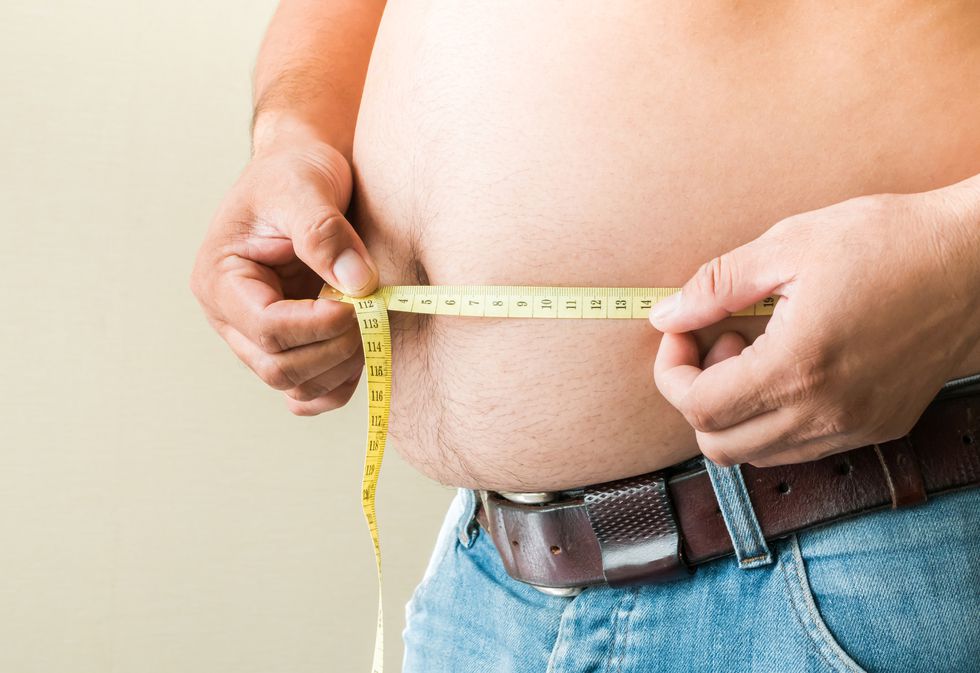Having a hard stomach isn’t always a good thing. In fact, if you have excess belly fat and it’s hard to the touch, it can be a sign that you’re at increased risk of serious illness.
“Having a hard belly is like having a ticking time bomb in your body,” says Jean-Pierre Despres, Ph.D., a professor of human nutrition at Laval University in Quebec City. “It increases your chances of heart disease and diabetes, and it’s worse than smoking or having high cholesterol.”
So what causes a hard stomach, and how can you fix it? Here’s how to go from a rigid, protruding gut to, if not a six-pack, a flatter, healthier stomach.

What causes hard belly fat?
A hard belly is caused by a high accumulation of visceral fat, which is located in the spaces between organs in your abdominal cavity. It’s packed in tightly, so there’s no jiggle room. As it accumulates in your abdomen, it pushes your abdominal wall outwards, which gives the appearance of having a gut. And while the fat itself isn’t actually hard per se, the tissues that make up your abdomen are, which is why your belly feels rigid when you poke it.
So what causes the buildup of this visceral fat? Well, a number of things. Some of it may be due to genetics: in fact, a 2014 study identified three genes that are related to waist-to-hip ratio (WHR), which determines how much visceral fat you have. Other research has suggested that while women may be more at risk of developing health problems as a result of excess belly fat, men are more prone to developing visceral fat to begin with (hence, why men are more likely to have so-called “beer guts”).
Diet and lifestyle also play a role. A sedentary lifestyle (i.e., barely exercising) is linked to having higher amounts of visceral fat, as is being on a high-fat diet.
What’s the difference between hard belly fat and soft belly fat?
While a hard, protruding gut is caused by the buildup of visceral fat, a soft belly is caused by subcutaneous fat, which is located close to the skin’s surface. If you have subcutaneous belly fat, your belly feels jiggly and softer to the touch (as demonstrated above). Unlike visceral fat, subcutaneous fat can also be pinched.
Like visceral fat, subcutaneous fat is largely caused by a lack of exercise and a high-fat diet filled with processed foods. Women are more likely to store fat as subcutaneous fat than visceral fat, though they start storing visceral fat when they reach menopause.
What are the risks of subcutaneous fat vs. visceral fat?
In itself, a small amount of subcutaneous fat is (relatively) harmless. But most people who have lots of subcutaneous fat also have lots of visceral fat, which has been associated with a number of health risks, including cardiovascular disease and type 2 diabetes, That’s because visceral fat is thought to secrete high levels of a molecule that has been linked to inflammation and insulin resistance, according to research from Washington University at St. Louis.
The health risks associated with belly fat are present even if you’re not overweight. According to a 2015 study in the Annals of Internal Medicine, people with a “beer gut” who were otherwise at a healthy weight still had a higher risk of dying of heart disease than people who did not have excess belly fat.
How do you get rid of visceral fat?
The good news: Losing just 5 to 10% of your body weight will strip 25 to 40% of your visceral fat. That means eating whole grains and cutting out high-fat and processed, sugary food items (yes, that means soda). You should also regularly be doing cardio, which has been proven to help get rid of visceral fat.
Emerging research also suggests that sodium-linked glucose transport inhibitors, which are used to treat people with diabetes, can reduce visceral fat and generally help you lose weight. “This does point to the possibility that there may be some physiological mechanisms that target visceral adiposity,” Dr. Barbara Kahn, the George Richards Minot Professor of Medicine at Harvard Medical School, told Harvard’s Health Watch.
If do you have a hard, protruding stomach, don’t panic. But you should take it as a sign that you need to make healthier changes to your lifestyle, and sooner rather than later.

